Alright, let’s do this.
- On January, I received my State of JS t-shirt. 👕
- On February, I physically attended JavaScript Bangkok. 🎟
- On March, I was mind-blown by the custom scrollbar CSS on Facebook’s new design. Turns out it’s a very fancy CSS Trick written by Das Surma back in 2017! 😱
- I built a pretty cool sparkline demo, using CSS
clip-pathproperty. 😎 - On April, I launched V2 of Check Weather SG web site. 🚀🌤🇸🇬
- Sort of virtually attended GitHub Satellite Virtual 2020. 🎟
- On May, I virtually attended !!Con (no, not BTS) and received a t-shirt. 🎟👕
- I revealed some sneak peeks of my 2nd iOS app. 👀
- Somehow I implemented dark mode for HackerWeb web site. 🚀🌗
- Had one-sided blocked ear. Went for earwax removal. 👂
- Virtually attended Jamstack Conf. Twice (second one on October). 🎟🎟
- I switched from my “Highlights of the week” to “Highlights of the month”, due to uh… lack of highlights. 🗓
- On June, I migrated from Google Analytics to GoatCounter.
- I rebuilt my rain radar screenshot app called ‘rainshot’. 🚀🌧📸
- I discovered and built one of the coolest CSS demo I’ve ever seen in a long time. 🤩
- Suddenly have to think hard about who’s going to be my successor on GitHub. Twice. 😅
- Eventually released my 2nd iOS app. 🚀
- I started selling some shirts on Cotton Bureau. 👕🤑
- Updated the dataset on my cheeaun.earth. 🚀
- Virtually attended WWDC20. 😛🎟
- Pleasantly surprised to see few of my projects featured on an article by Urban Analytics Lab. 🌟
- I’ve updated the dataset for ExploreTrees.SG. 🚀🌳🇸🇬
- Also fiddled around with 3D buildings. 🏢
- By end of the month, I moved from Carbon Ads to Adsense, for BusRouter SG. 🤑
- On July, I updated the dataset for Repokémon. 🚀
- Voted for the first time. 🗳
- I showed multiple sneak peeks and some of my learnings of the newly redesigned RailRouter SG. 🚀🚆🇸🇬
- Had fungal ear infection. 👂
- On August, I bought and played The Battle of Polytopia and Townscaper. 🎮💸
- I’ve also launched V3 of TaxiRouter SG, played around with 3D taxi models and got some attention from Reddit /r/singapore. Eventually designed a 3D taxi model myself. 🚀🚕🇸🇬
- Performed a hearing test and have tinnitus on my right ear. 👂
- My BusRouter SG site got featured on The Straits Times. 🌟🚌🇸🇬
- On September, I virtually attended GeekcampSG. 🎟
- On October, I finally got my Kickstarter-backed SlimFold wallet, which was delivered to the office. 💸
- Got myself a replacement left earbud for my AirPods Pro. 🎧
- Virtually attended Next.js Conf. 🎟
- On November, I received my Kickstarter-backed t-shirts. 👕
- Virtually attended DevRel/Asia. 🎟
- On December, I got replacement earbuds again for my AirPods Pro. 🎧
- I've released HackerWeb V2 iOS app, after showing so many sneak peeks. It’s also listed on Airport, featured on Reddit /r/reactnative and mentioned by Brent. It’s not a free app, but I decided to make it free until the last day of 2020. 🚀🛄😎🆓
- I’ve also released Check Weather SG v1.1.0 iOS app, which has the new iOS 14 widgets. 🚀🌦🇸🇬
- Bought a new Macbook Air (M1). Did some reviews. 💻
Statistically, I’ve attended 7 conferences (not counting WWDC), re-launched/built 4 apps and launched 1 new app this year. My projects got featured twice.
Bangkok
It’s really weird talking about travel this year, but I did travel once on February as the pandemic situation started spreading since the beginning of the year.
I planned to attend JavaScript Bangkok since last year and purchased a ticket on 5 January. During that month, there were already one confirmed imported case in Singapore and it was quite worrying as the day passed. I’ve had my doubts about the trip and was ready to bail out if the situation worsens. Note that face masks were not compulsory yet during that period of time.
On 7 February, I departed from Singapore to Suvarnabhumi Airport (BKK).
The first few things that I got on my hands are the Airport Rail Link token ticket, MRT card and BTS Rabbit card.
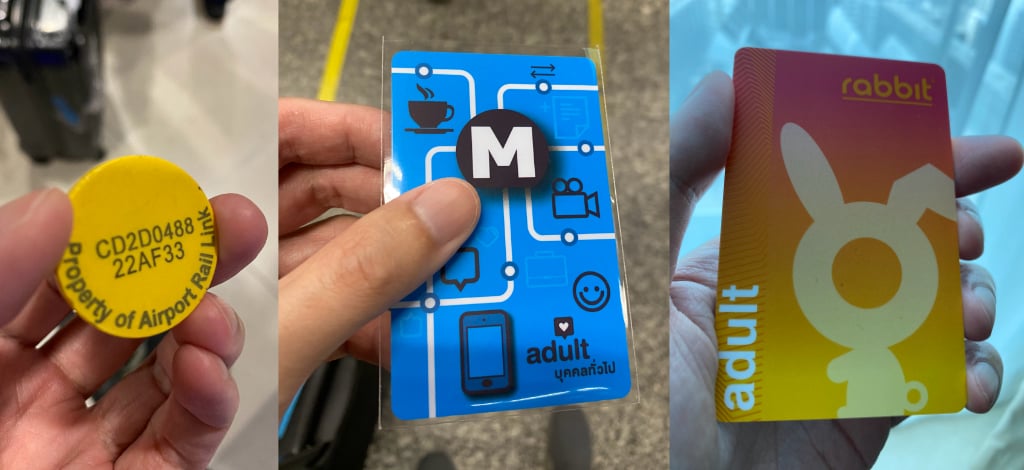
The weather was hot (33-35°C 🔥). The air quality was moderately unhealthy. And there’s the uprising pandemic. 😓😓😓
On the next day, I attended the conference. Saw Hui Jing, Thomas and Thai there.
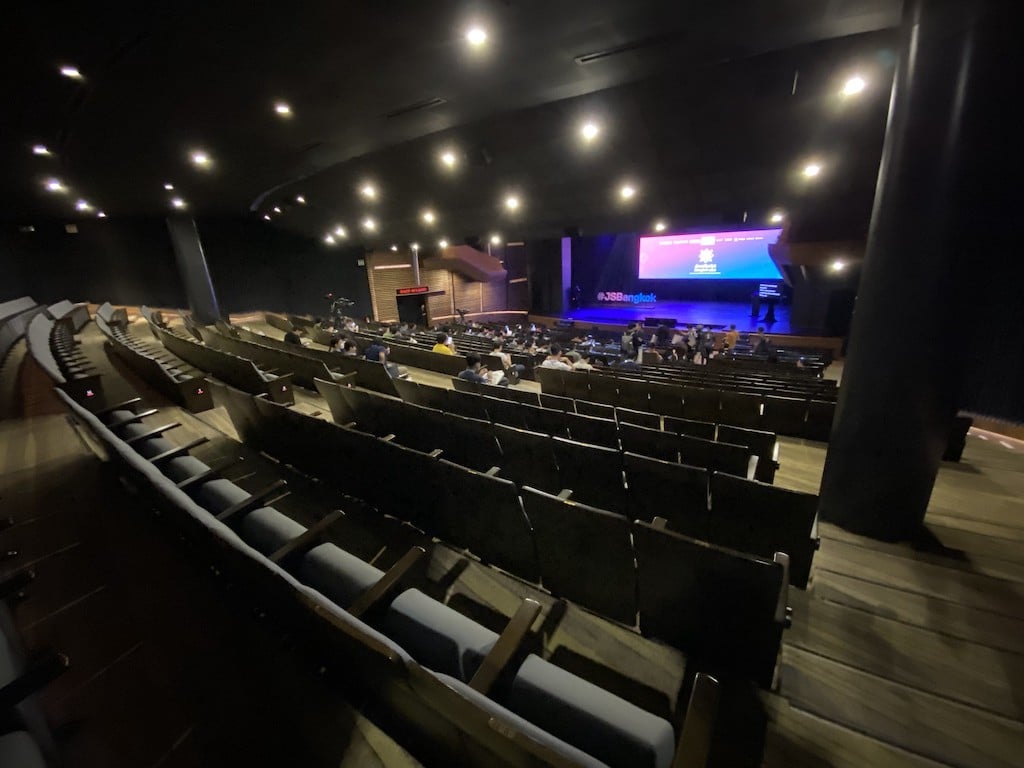
Some talks are in Thai, and there’s a screen on the right side that shows real-time English translations.
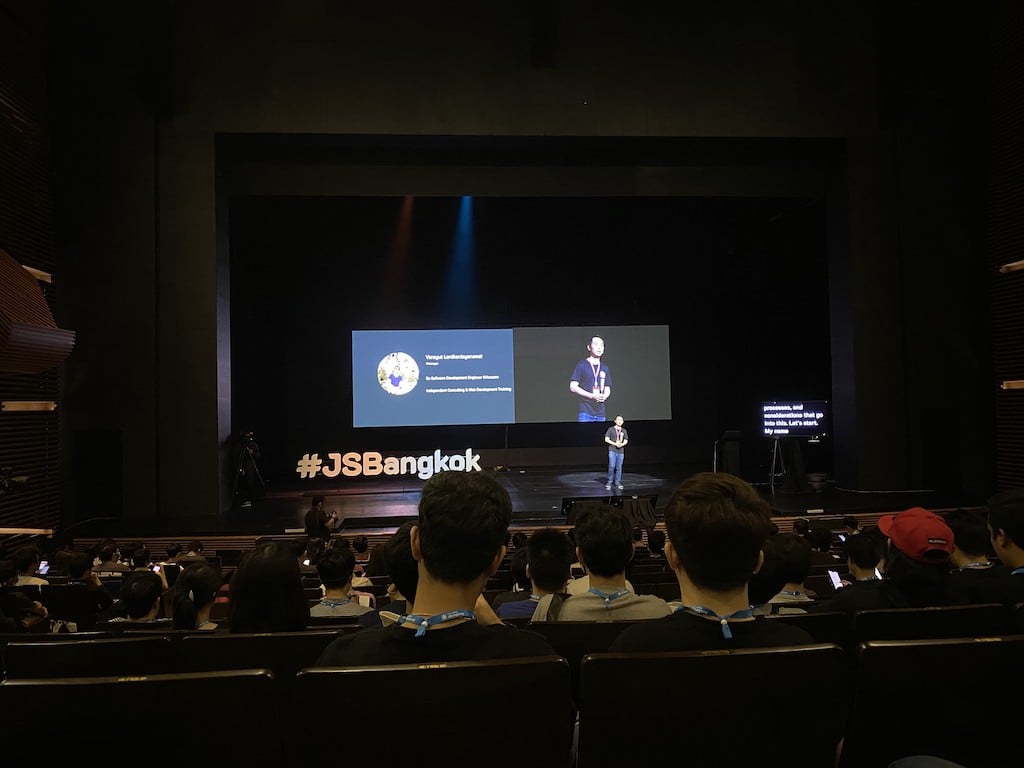
The food during lunch time was pretty good. 😋
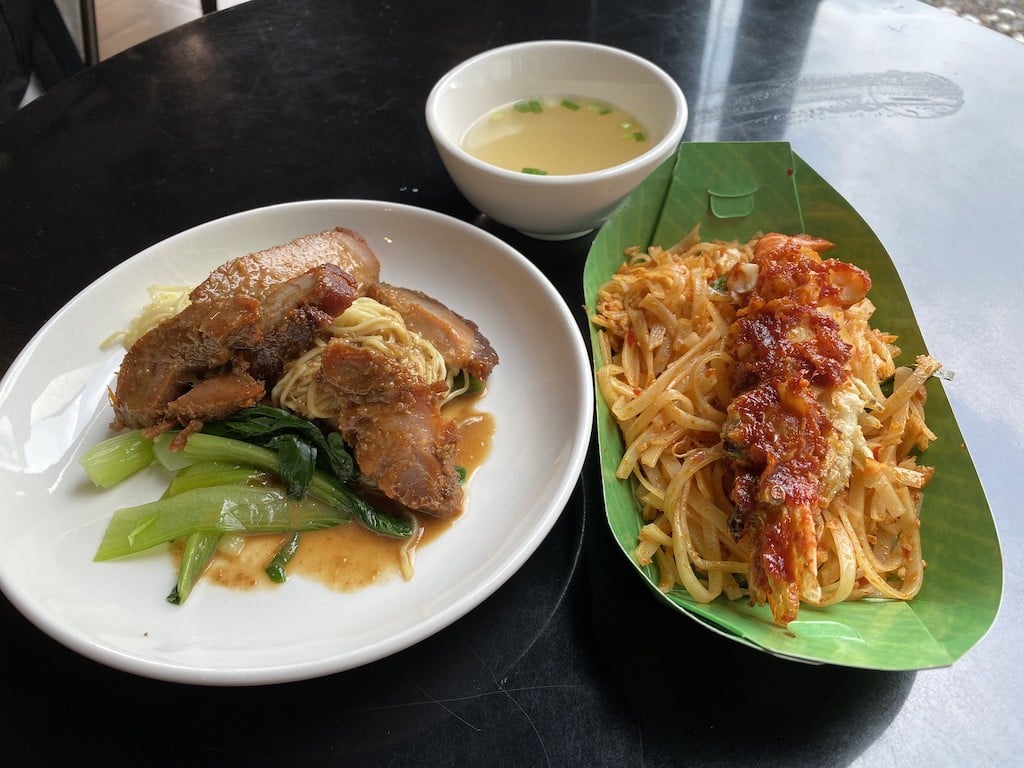
Back to the conference.
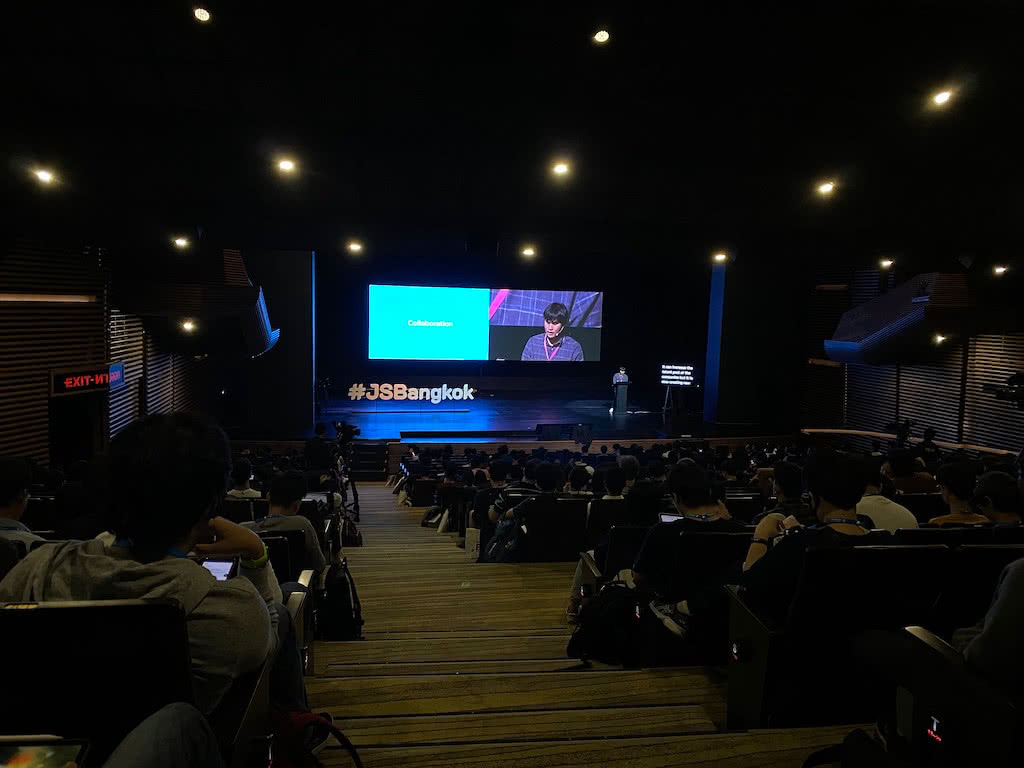
And not forgetting the swags!
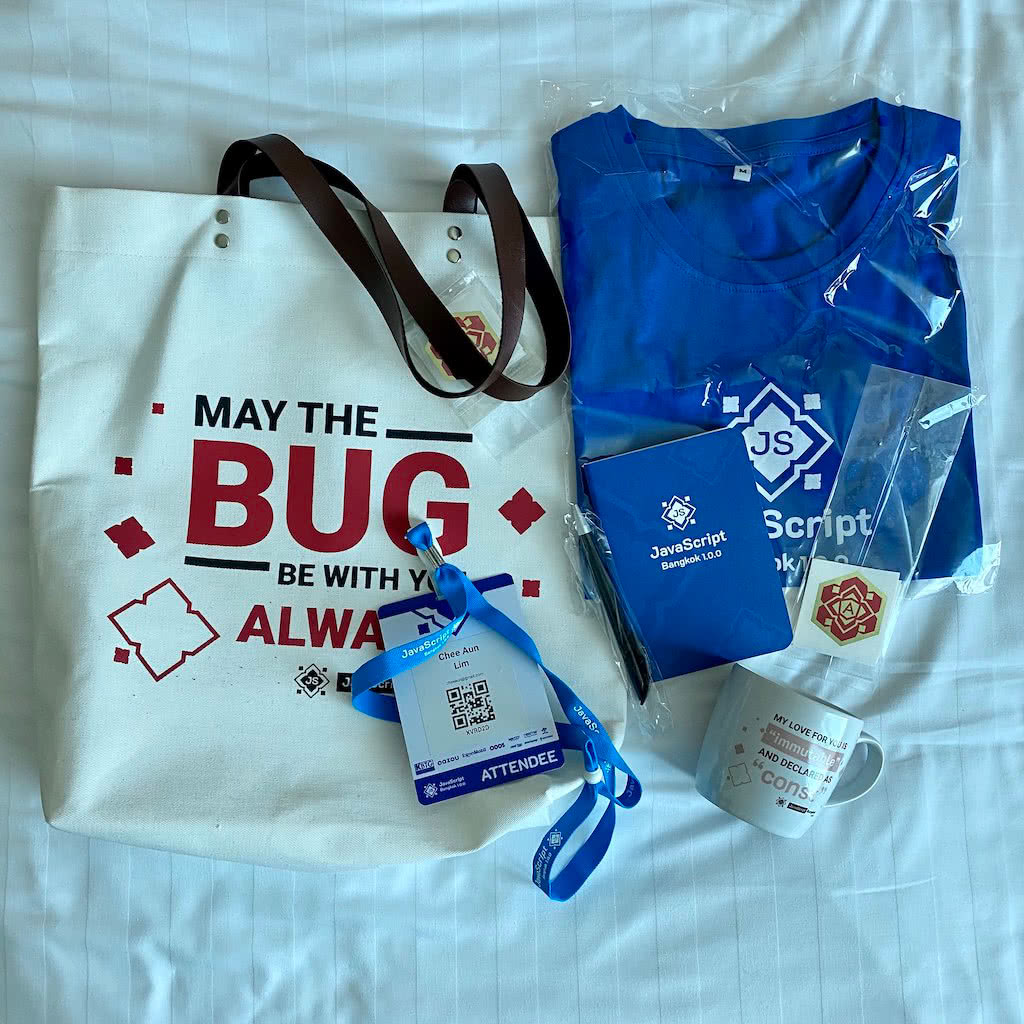
The next few days, I turned on my tourist mode and visited a few places:
- Artbox (night market)
- ICONSIAM + Apple Store
- Chinatown
- King Power Mahanakhon SkyWalk
- Bun Meat & Cheese (of Homeburg fame) 😋
- Wat Pho
- The Grand Palace
- Temple of Emerald Buddha
- Train Night Market Ratchada
- Victory Monument
- Chatuchak (most stores closed as I went during weekend 😅)
It’s not as many places as I expected, as the weather was hot and hazy at the same time. There were people already wearing masks, possibly due to the pandemic or the haze (or both?). There were also people giving out free masks. Every single entrance in shopping malls and train stations have hand sanitisers. There was an unfortunate mass shooting around that time, so all train stations and shopping malls also have metal detector gates that everyone has to go through, with occasional bag check.
Boy, did I choose one of the worst times to visit Bangkok, right? 😅
Anyway, some photos to cheer up a little.
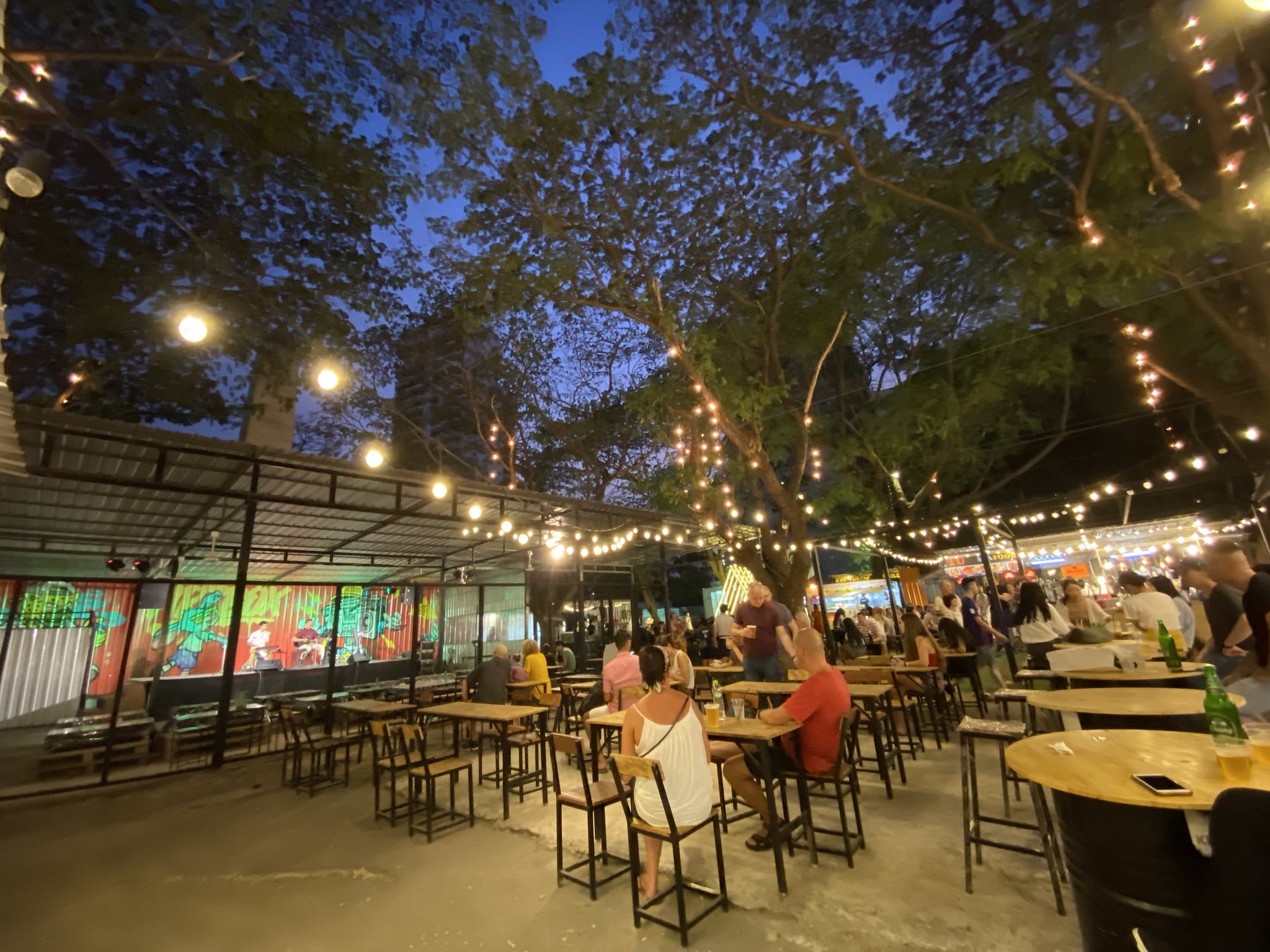
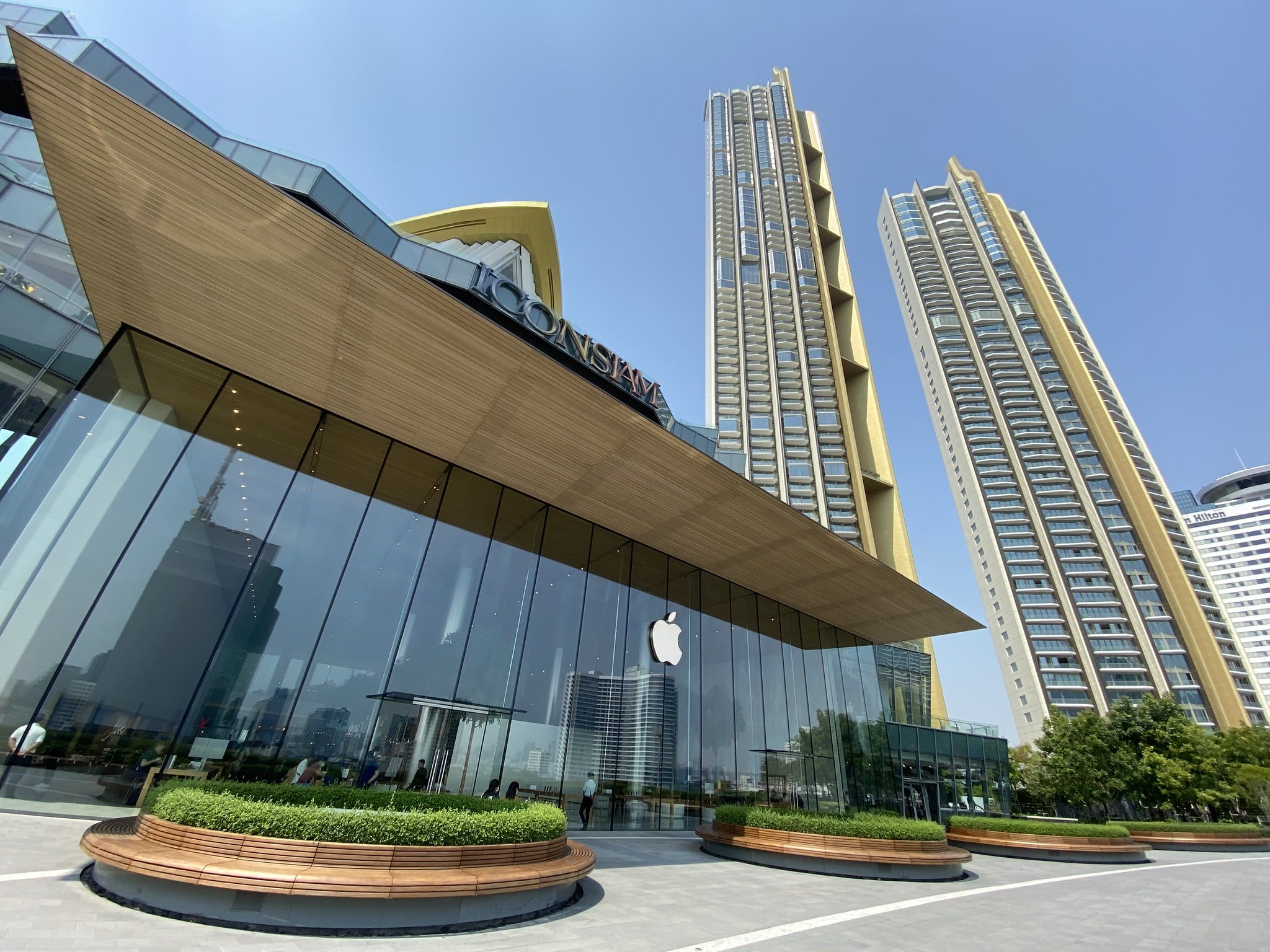
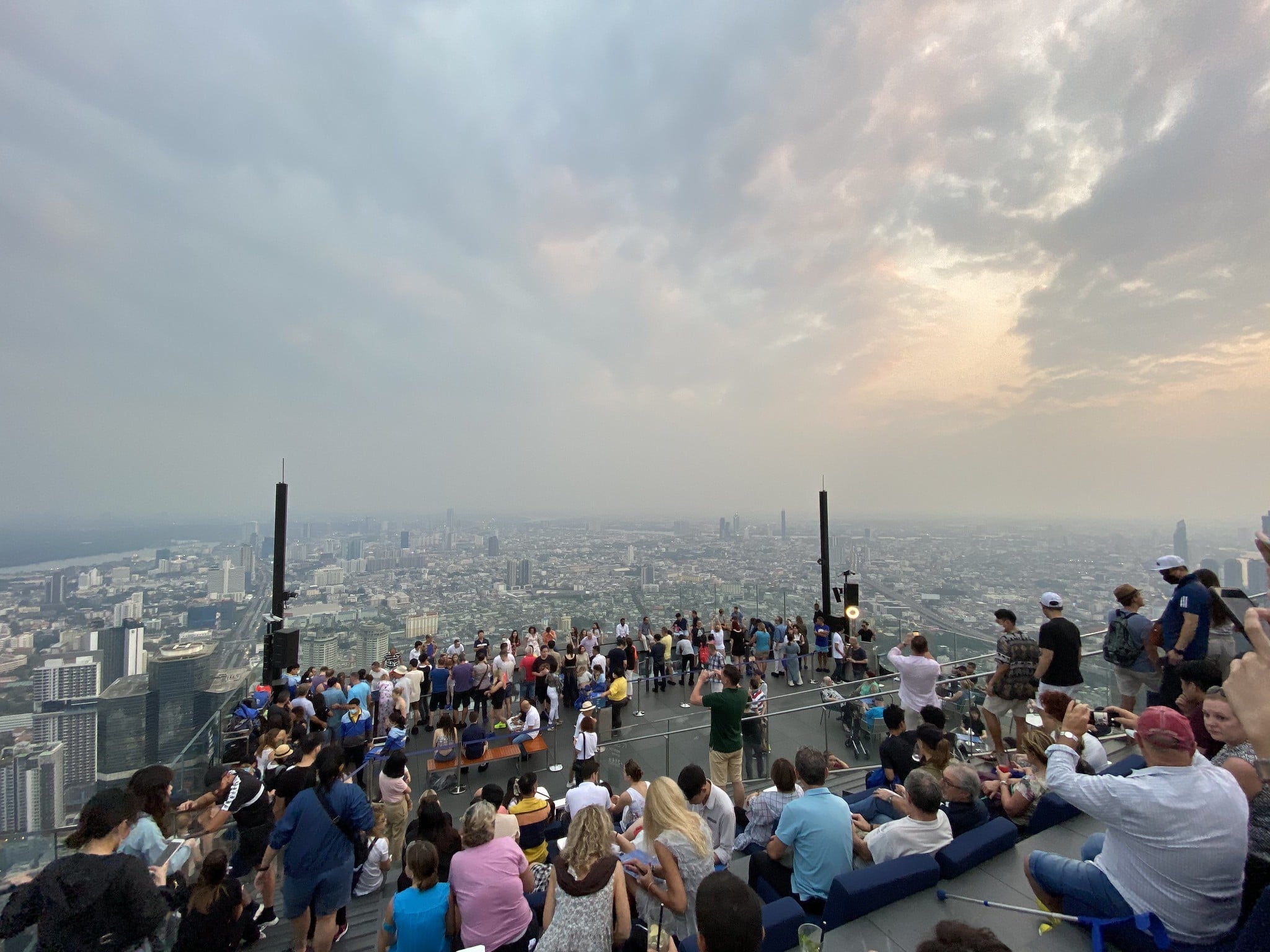
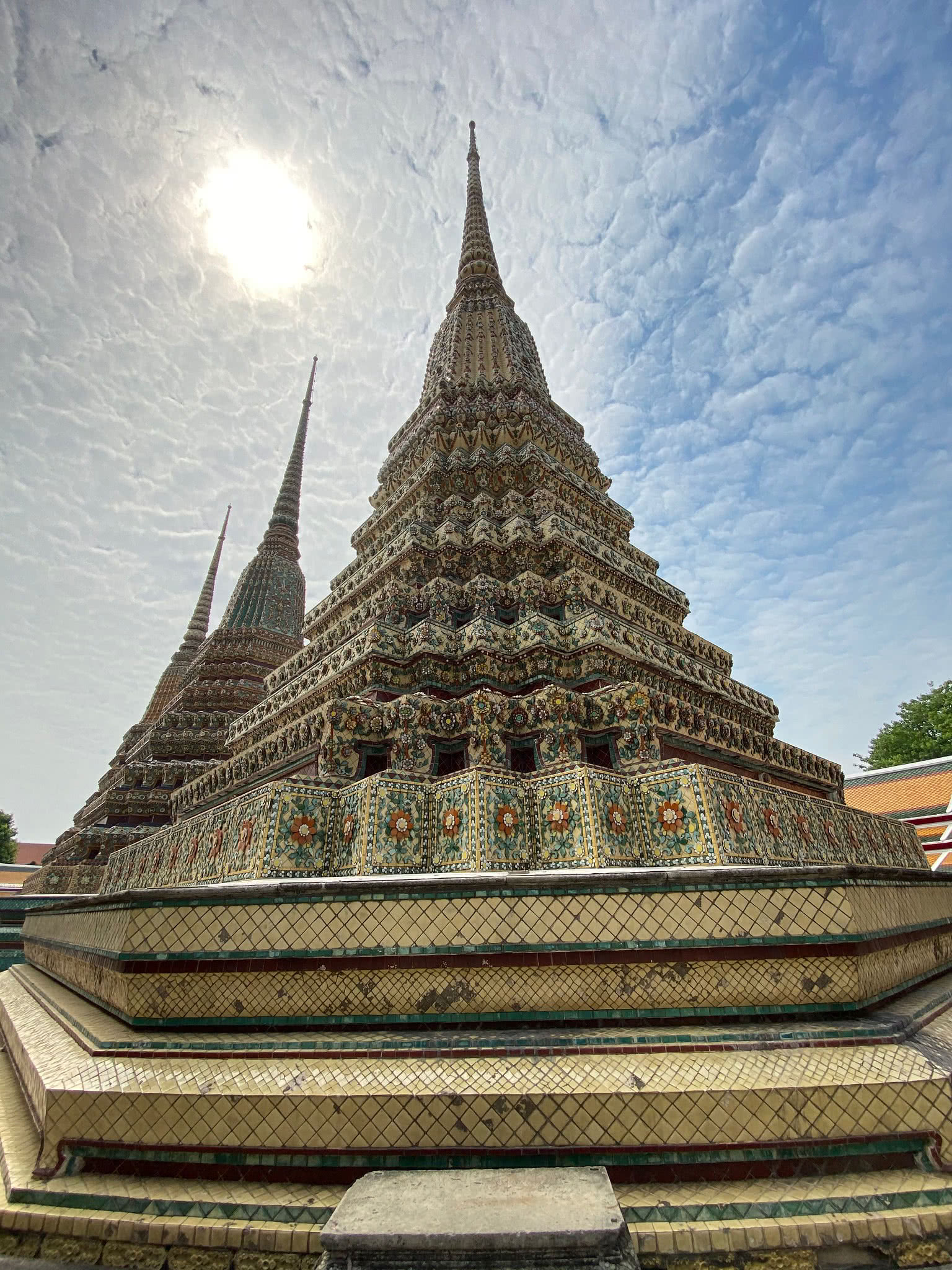
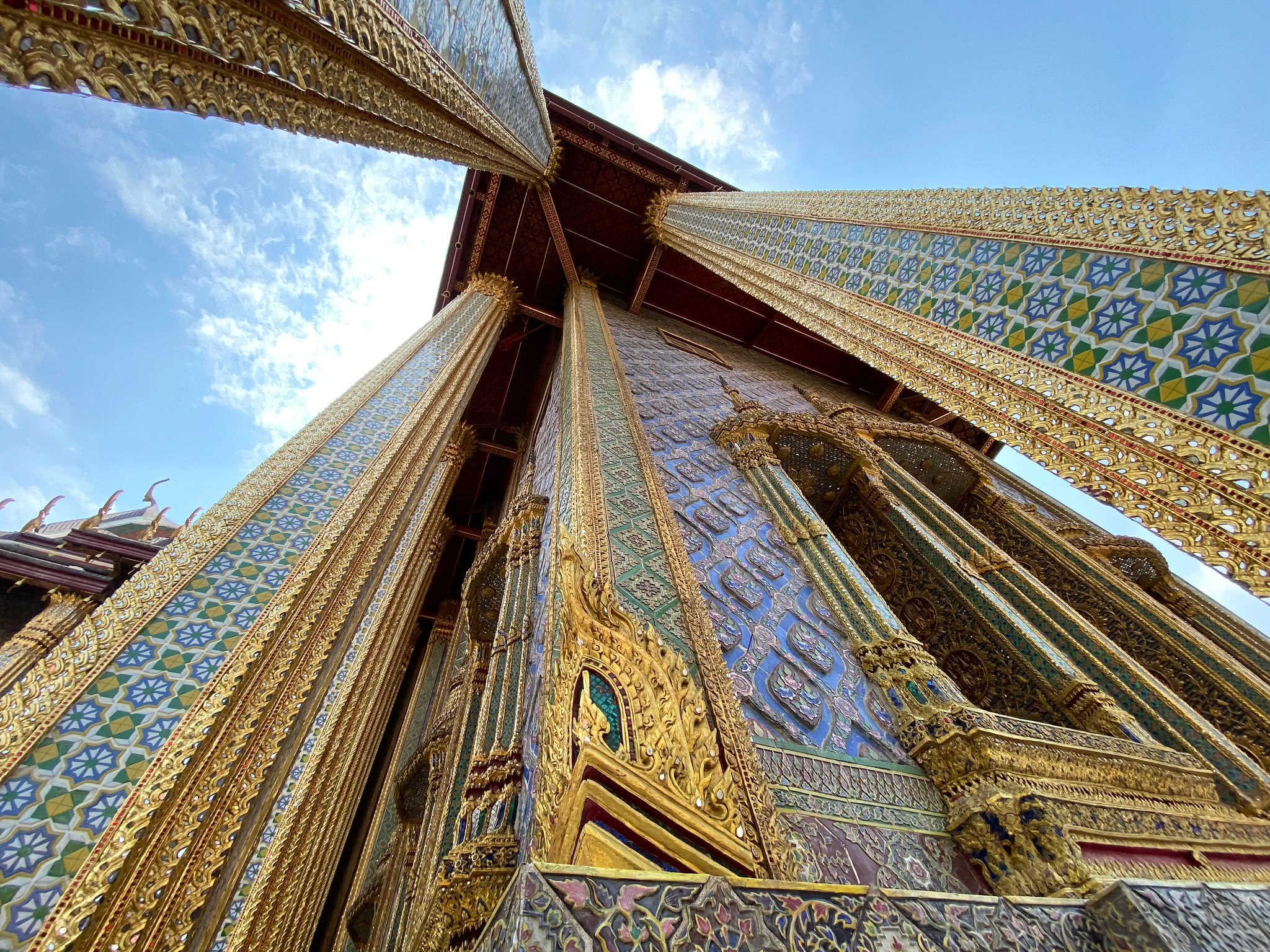
During the trip, I ate pad thai, drank milk tea, drank mango juice, discovered Thailand’s date and time notation, ate pork rice, ate burgers, ate crickets 🦗, saw a cat while looking at a ticket attached with a coupon that gives free drinking water, ate mango sticky rice, braved through the heat, ate Khanom bueang, and ate boat noodles.
One of the good things that happened is that I got a free upgrade to a Grand Suite room due to a water leak in the bathroom. 😃
My observations:
- There’s a plastic bag ban since January. But I still get plastic bags at some 7-eleven and Family Mart stores 🤷♂️.
- Makha Bucha Day was on 8 February.
- For the escalator etiquette, stand on the right side.
- To enter Grand Palace, men are required to wear long pants. I was wearing shorts… because weather 😅. Stalls were selling them for $200-220 THB. After that, I didn’t realise that they are refundable and also rentable from some stalls. 😑
- There’s no Uber. There are alternatives like Grab and LINE MAN instead.
On 13 February, somehow I manage to have dinner and ice-cream for dessert together with Henry Lim, Jenny Wong and a few WordPress folks. Got myself a WordCamp Asia sticker too, which the conference itself was cancelled due to the pandemic.
On 14 February, I took a cab to the airport, received another free mask, tried out the Business Class Lounge and flew back to Singapore.
The stats:
- 123 Swarm check-ins.
- 12 Instagram posts.
- 517 photos and 3 videos on Flickr.
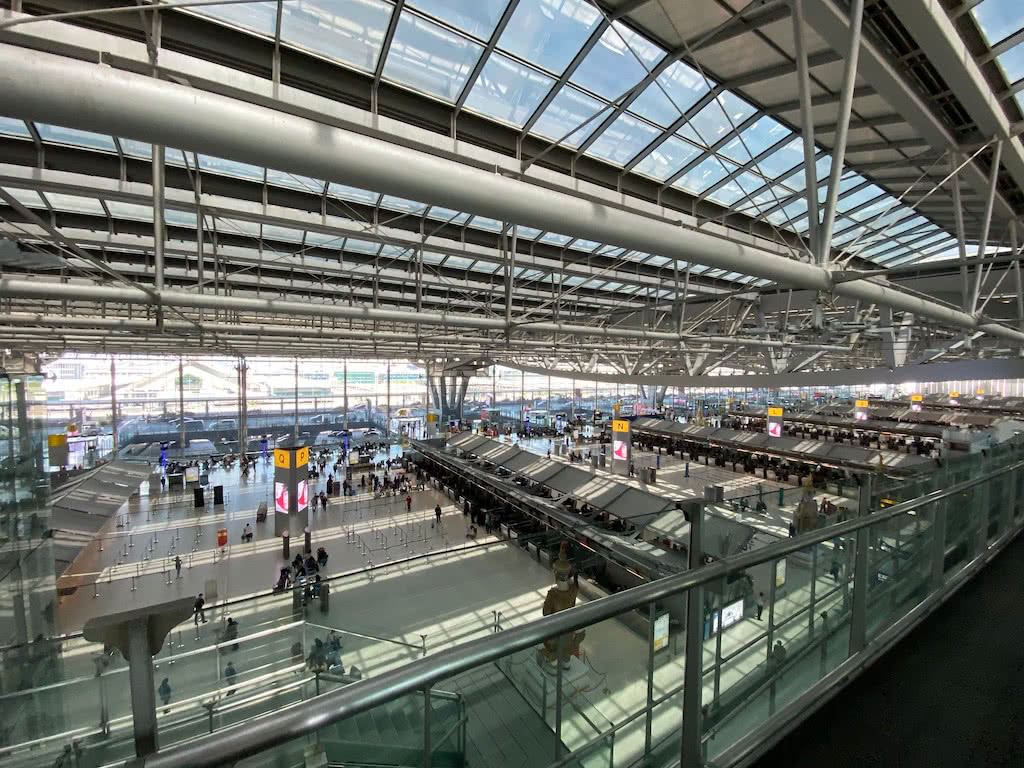
Work from home
After my Bangkok trip, to be safe, I did my own self-enforced 14-day "Stay-Home Notice" (SHN) before start going out and working in the office. At that time, the real SHN took effect on 18 February and apply to all returnees with recent travel history to China (outside Hubei) within the last 14 days. It’s also generally advised by the Ministry of Manpower to work from home where feasible. So I’ve been working from home since the day I returned from Bangkok. I went to the office just for few days on March. On April, circuit breaker was announced and everyone worked from home.
Working from home is quite challenging.
Story time. A few years ago, I was thinking about remote working. I did some analysis and decided that it’s not for me. I like working with people in a physical space. It feels more like a team when there are engineers, designers and product managers sit together, working towards a common goal. It’s easier to discuss things, pair programming, and sometimes quickly get an opinion.
There’s also an impression that I personally imposed on myself that working at home doesn’t feel like work. Or rather, I would need a specialised setup, like a nice desk and chair, something that the office already have. I don’t have such privileges so I probably need to go to other places to work, like Starbucks or a dedicated coworking space. Even then, it would feel kind of lonely, to work by yourself and go for lunch by yourself.
Talking about lunch, I really enjoy lunch hours with my colleagues. I always prefer longer lunch hours instead of restricted timings that are imposed in some other stricter companies. I like the moment that after having lunch with my colleagues, we would explore places like trying out a hipster coffee shop or a newly-opened bubble tea stall across the street. And then taking the sweet time to walk back to the office while chit-chatting about non-work stuff.
Remote working was kind of like a hipster thing, in my opinion, mainly due to not a lof of companies doing it, especially in Asia. There are even sites like remoteok.io (since 2015) dedicated to listing companies that allows people to work from (almost) anywhere.
Before 2020, I’ve never tried this. But I do know how it feels like working with remote colleagues, in companies that have multiple offices in different countries. Timezone really make things difficult when we have to set meetings at unusual hours. Can’t really miss them if they’re important. Either I have to wake up earlier than usual or stay up late at work. It drains even more energy if the meeting is not very productive. Decisions are also delayed and communications become asynchronous.
Despite all the inconveniences, this year, all of us have no choice but to embrace this new style of working, though slightly more restricted due to lockdowns and such.
There are pros and cons.
The pros:
- ⏰ Saves a lot of time by not taking public transport to work. I personally always factor in travel time when finding jobs. If it takes more than an hour to reach work or return home, it’ll be too tiring for me. Sometimes I’ll explore alternative routes, thus one of the reasons why I built a lot of transport-related web apps, to check if there’s a faster or least-traffic way.
- 🥶 No more super-cold air-con. Offices in Singapore always set their air conditioning to be super cold. Everyone has to wear sweaters inside and take them off when going out for lunch. It’s the opposite of cold-weather places like Tokyo and San Francisco.
- 💅 Meetings got more comfortable. In the beginning, sometimes I’ll turn on the camera to show my face, but after just a week, I turn them off completely. So, it’s a pure audio-only discussion and lecture-style presentation, kind of like a live podcast or YouTube stream, where you can’t pause, rewind or change the playback speed. Since no one’s looking, I even cut my nails during a meeting.
The cons:
- ⚖️ Blurred work-life balance. Every day, I wake up, eat, work, eat, sleep and repeat, all in the exact same place. Turns out the travel time to and fro work is a good transition to inform the body that it’s work mode versus personal time mode. Weekends start to feel like weekdays. Some of us have to do household chores while working. Some have kids and need to take care of them, while in a meeting. It’s a huge mess.
- 🥱 Lack of exercise and sunlight. I generally don’t exercise much, but I really like to walk. Commuting between home and work helps. While working from home, I keep having backaches and have to consciously stand up and stretch every few hours. When I go out to buy food and things after weeks of staying at home, I felt so, so, so much better.
- 🐣 Everyone is a remote-working beginner. I agree, it’s tough. Too many meetings. People joining multiple meetings at the same time. Some people treat meetings as background noise and always ask “Could you repeat that again?”. Too many one-to-one private messages. Lack of company-wide conveniently-searchable written communication and documentation. Not fully utilising all the available web-based tools that are built for online team communication.
It took some time to adapt, now that the cheese has moved.
I try my best not to open both my work and personal laptop at the same time. I set reminders for myself to stand up, stretch and do light exercises. Notion and Figma helped a lot for work, especially for online collaboration, besides the usual suspects like Slack and Jira. I use Google Meet Enhancement Suite for auto-mute and auto-video-off. I also use MuteKey to actually mute the microphone at the operating system level, because Google Meet’s “mute” button doesn’t really do its thing because it needs to warn people that they might be talking while muted.
On some days, it gets very exhausting.
It’s stressful to continue working while the whole world is on fire. Hearing, talking or reading news about the pandemic every single day doesn’t really help much for mental health. Keeping track on the number of cases every single day doesn’t help at all. All the while, there are worries about laid-offs, reduced salaries, affected businesses, sold-out toilet papers, and not being able to go back hometown due to lockdowns.
There are some days that I felt quite productive doing work, and some that I don’t. I was both mentally and physically fatigued once every few weeks and I couldn’t do much work at all. And I tell myself that it’s fine to rest because there’s nothing more important than my own health. Work can come later.
On October, measures were eased as community cases remained low. According to the Safe Management Measures guideline, work-from-home is still the default and employers must ensure that no more than half of employees who are able to work from home are at the workplace at any point in time. So, I went to the office once a week; a decision that my colleagues and I made. No point going to the office and still have to virtually dial in for meetings or discussions.
For the past few months, I’ve had a very oddly familiar thought to this not-so-flexible "remote working” lifestyle. I realised that there’s a huge lack of written communication and documentation. A lot of the online tools like Slack and Jira allows commenting and threads, which can facilitate tasks around, though not many people actually fully utilise them. There are simple things that I thought that everyone should know, like writing a good pull request or bug report, writing useful comments in code, keeping track of tasks, proactively tag folks when discussing certain topics, keeping track of any changes or decisions made, writing down meeting notes, keeping meetings short and on-topic, use large fonts for presentation slides, always share links to slides or notes during or after a meeting, taking screenshots or videos when reporting bugs or discussing about user interfaces, and more.
It reminds me… of the open-source world.
Many people might have different interpretations of open-source. For me, I’ve personally contributed to open-source projects and maintained a few. In other words, I’ve been on both sides of the spectrum. Contributors, users, and bug reporters are all remote and from all over the world. I’ve never met most of the people who approved my code contributions and those who contributed to my projects. I had to learn how to write good bug reports, with detailed reproduction steps, because it helps the maintainers to understand and debug. I have to learn how to write good documentation with clear screenshots for my projects so that it can be used by other developers. I have to learn how to review other people’s code, ask them questions if I don’t understand certain parts, and reason with them if I disagree with certain logic or paradigm. I also have to manage the issues, close them if there’s no activity, ask for more information if the issue lacks details, tag them nicely for organization, and even moderate the comments if things go haywire. While maintaining code, I also have to handle the marketing and monetisation side of things by building a web site, creating a new Twitter account, adding donation links, writing articles, and offering customer support.
All of these, without ever meeting anyone face-to-face or over video/audio calls.
I had a thought that open-source folks and organisations have been doing remote work even before it was a hipster thing? And I somehow subconsciously have done it?
Weird…
Looking back
2020 changed everything.
It’s the year that I’ve been hearing a lot since childhood in Malaysia. Vision 2020 is a Malaysian ideal introduced by the 4th (and 7th) Prime Minister of Malaysia in 1991. I moved to Singapore in 2009 (24 years old) and here I am now a Singaporean citizen…
It’s the year that I expect everyone had plans to make some dramatic life decisions. I mean, it’s twenty-twenty, sounds good to the ears. Some people quitted their jobs despite others who were actually laid off. Marriages were still happening despite all the social distancing and safety measures. Though perhaps I’m one of the few others who decided to play safe and just be grateful with whatever I have right now.
It’s the year that everyone stopped travelling. Wait, I did travel on February, so should probably consider myself lucky. However, even if travel is allowed, it wouldn’t be enjoyable anyway during pandemic times. Imagine yourself enjoying life while the number of death cases around the world going up, is definitely not a thing that I would want to do. For me, travelling has always been optional. I actually spent the first 4 years in Singapore, not travelling anywhere at all, except returning to my hometown in Penang and attending my cousins’ wedding dinners. Maybe there’s no YOLO blood in me at that time, but I was actually focusing a lot on clearing my university education loan and house loan. Travel is a privilege, not a right. Telling others that you’ve been to many countries is not a huge achievement that you should be proud of.
Throughout the year, I’m glad that I still have the energy to work on my side projects, learn new things and continue to find inspiration over little discoveries. I’ve made over 598+ commits, 10 issues and 10 new repositories on GitHub. The unfortunate thing would be that I didn’t write any blog posts about my side projects this year. I just don’t feel like writing, so not going to force myself.
I also found my new favourite pastime on Twitter which is to reply to people’s quotes with funny animated GIFs. Most of them are on Ten’s tweets. 😂 I did the same thing too on Facebook posts, too bad that most of them are private and not linkable.
Being stuck at home, I started to binge-watch a lot more older anime’s than usual, besides just watching this year’s anime's. Few of the ones that I found surprisingly interesting are Dr. Stone 👨🔬 (2019), Youjo Senki (2017), Gate (2015, 2 seasons), Kono Oto Tomare! 🎼 (2019, 2 seasons), Ballroom e Youkoso 💃 (2017), High Score Girl 🎮 (2018, 2 seasons), Honzuki no Gekokujou 📚 (2019, 2 seasons) and Kaze ga Tsuyoku Fuiteiru 🏃♂️ (2018).
I’ve also found another form of entertainment this year: Uncle Roger. I personally find this funny because when I watch reaction videos on anime episodes that I've watched, some folks find me weird. Now, it's okay for everyone to watch people acting as fictional characters reacting on other people's videos. And then it escalated to reaction videos on reaction videos. 🤦♂️🤦♂️
Apart from that, I’ve also been quite grateful to watch another genre of TV shows that I never thought would have watched and accidentally picked up since last year. They are Heart Signal 3 (aired on March–July) and Heart Signal 3 (Chinese) (September–November). I literally binge-watched all the previous seasons ever since the day I accidentally watched one of the similar-genre shows on TV during my last Seoul trip. Yes, they are Korean reality shows. Getting curious, worked up and invested in other people’s lives is probably one of the best ways to stay sane during pandemic times, I think. Also, unexpectedly heartwarming.
To sum up, this year feels really short. The whole 12 months felt like just 3 or 4 months to me. Lucky that I’m quite good in keeping track of things I’ve done, else I would probably feel like I did nothing for the whole year.
Did I learn a lot of things this year? Heck yes.
How about my physical health? Kind of okay, still occasional backaches, headaches, gastric, and developed a tinnitus.
How about mental health? Pretty okay so far, but there’s always a slight tint of loneliness and anxiety.
What happened to my Twitter? Oh yeah, I unfollowed almost everyone, decreased from less than 600 to less than 10 followings. I “follow” people using Twitter lists instead.
Wait, how about all the trends? Nope, I’m not into ‘Animal Crossing’, ‘Among Us’, ‘BTS’, ‘Tiger King’, ‘The Mandalorian’, ‘Wonder Woman 1984’, etc. I don’t own a Nintendo Switch™ and don’t even have a Netflix subscription. Does that make me feel disconnected from the world? Maybe, but… I’m typically a “my pace” (マイペース) person and I feel it’s rather close-minded to think that the whole world only revolves around them.
The new year is coming and I got to say, it’s a bit difficult to welcome it as the pandemic is still around. There are still a lot of cases in many countries and our front-line heroes are still working really, really hard, while the rest of us sitting comfortably in our houses. There are still some uncertainties and lingering issues that require careful preparations and planning in phases.
All I can do now is simply taking a small step forward, one at a time.